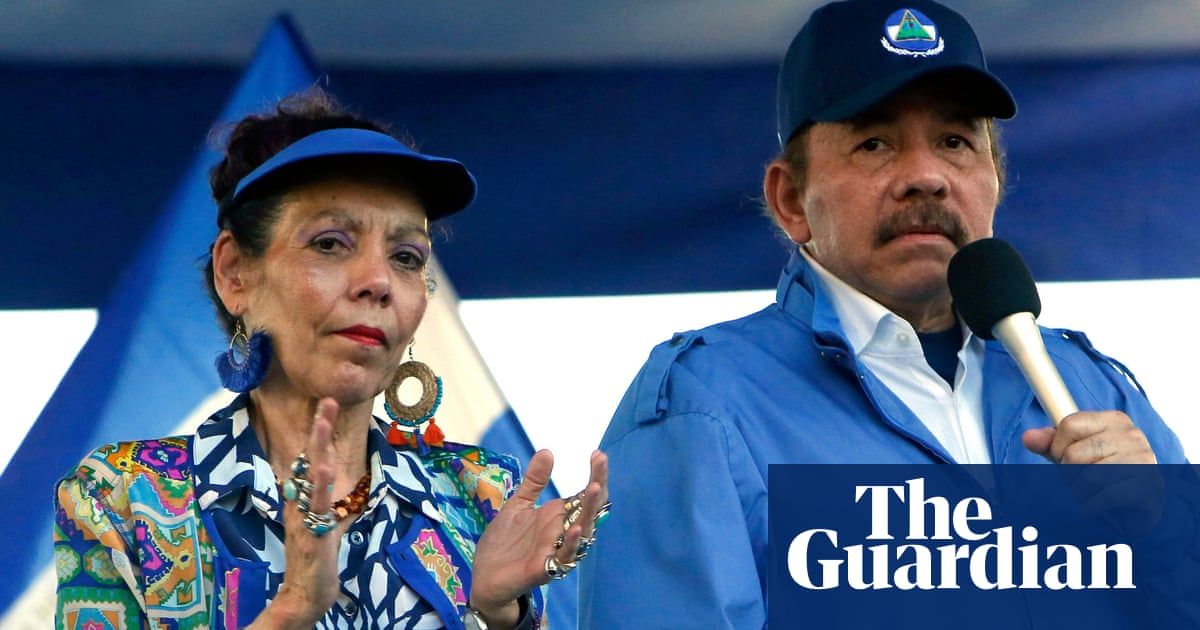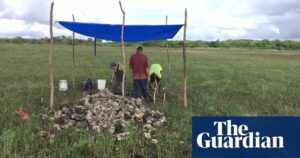
Nicaragua’s President Daniel Ortega and his wife are set to assume absolute power after loyalist lawmakers approved a constitutional amendment elevating her to the position of “co-president” and boosting the pair’s joint control over the state.
Under sanctions for human rights abuses, Ortega himself had proposed the change, which also increases the president’s control over the media and extends the presidential term from five to six years.
Nicaragua’s national assembly is under the control of Ortega’s ruling FSLN party, and the parliament chief, Gustavo Porras, said the measure was approved “unanimously” on Friday.
It is all but guaranteed to pass a second reading in January.
Ortega, 79, has engaged in increasingly authoritarian practices, tightening control of all sectors of the state with the aid of his powerful wife, the 73-year-old vice-president, Rosario Murillo, in what critics describe as a nepotistic dictatorship.
The ex-guerrilla had first served as president from 1985 to 1990, returning to power in 2007. Nicaragua has jailed hundreds of opponents, real and perceived, since then.
Ortega’s government has targeted critics, shutting down more than 5,000 NGOs since 2018 mass protests in which the United Nations estimates more than 300 people died.
Thousands of Nicaraguans have fled into exile, and the regime is under US and EU sanctions. Most independent and opposition media now operate from abroad.
The constitutional amendment stipulates that “traitors to the homeland” can be stripped of their citizenship, as the Ortega government has already done with hundreds of politicians, journalists, intellectuals and activists, among others perceived as critical.
Ortega and Murillo accuse the church, journalists and NGOs of having supported an attempted coup d’état, as they describe the 2018 protests.
The change also allows for stricter control over the media and the church, so they are not subject to “foreign interests”.
And it gives the co-presidents the power to coordinate all “legislative, judicial, electoral, control and supervisory bodies, regional and municipal” – formerly independent under the constitution.
Manuel Orozco, a Nicaraguan analyst for the Inter-American Dialogue, told AFP the reform “guarantees the presidential succession” of Murillo and the pair’s son, Laureano Ortega.
The Geneva-based UN human rights office in its annual report on Nicaragua warned in September of a “serious” deterioration in human rights under Ortega.
The report cited violations such as arbitrary arrests of opponents, torture, ill-treatment in detention, increased violence against Indigenous people and attacks on religious freedom.
The revised constitution will define Nicaragua as a “revolutionary” and socialist state and include the red-and-black flag of the FSLN – a guerrilla group-turned political party that overthrew a US-backed dictator in 1979 – among its national symbols.
Constitutional law expert Azahalea Solís said this change excludes other political ideologies, while Salvador Marenco, a human rights lawyer exiled in Costa Rica, said it would end political pluralism and the doctrine of separation of powers.
“Everything in the reform is what has actually been happening in Nicaragua: a de facto dictatorship,” Dora María Téllez, a former comrade in arms of Ortega turned critic, told AFP from exile in the United States.
When it was proposed by Ortega earlier this week, the Organization of American States secretary general, Luis Almagro, described the amendment as “an aberrant form of institutionalizing the marital dictatorship”.
He also labeled the initiative an “aggression against the democratic rule of law”.
Source: theguardian.com

















